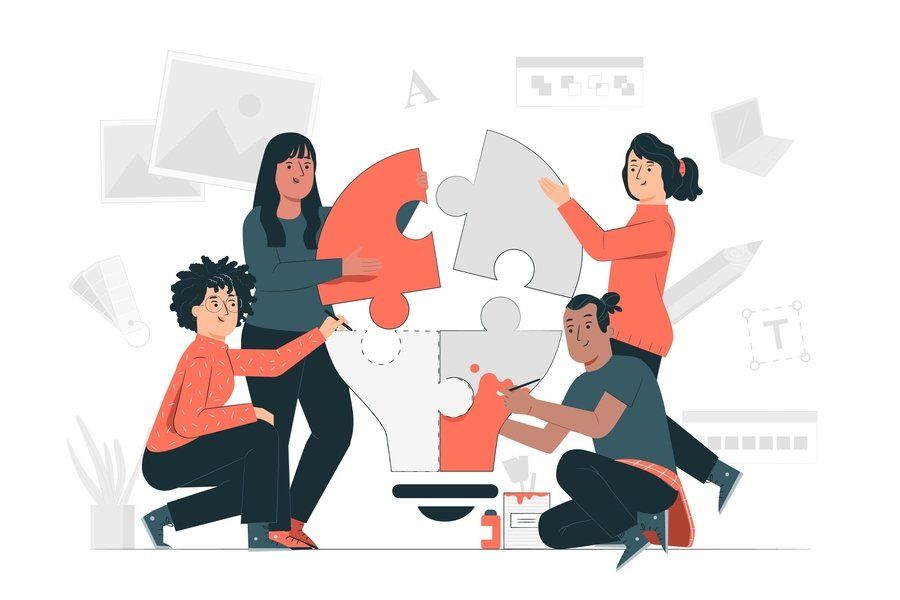The Key to Empowering Your Team

Vector image from freepik.com
Empowering your team means giving them permission to act, work with a level of autonomy, and make decisions. It means building trust, creating a safe space where all members of the team feel they can reach their full potential, and developing a shared understanding of goals and outcomes. Empowerment cannot be handed over like a gift or a task. It is not something that happens suddenly.
A powerful way to empower the individuals in your team is to simply ask, ‘How can I help you?’ This is a trust-building question, and a great way to start a coaching conversation – two key components in empowering your team. Without trust, a team is simply a group of individuals doing their own thing. It doesn’t matter how capable or talented the individuals are: a team that lacks trust will not reach its full potential.
The Impact of Distrust Versus Trust
Neuroscience research (1) indicates that trust and distrust activate different parts of the brain. Distrust is associated with the amygdala, the area of your brain triggered by stress, and leads to cortisol production. An atmosphere of distrust in a dysfunctional team is likely to mean that team members experience continued high cortisol levels. This impacts their ability to think and reason effectively, since cortisol shuts down activity in the prefrontal cortex, the brain’s executive functioning area.
When you feel safe and trusted by the people you interact with, oxytocin is produced, which increases social confidence and connection. More oxytocin in your system increases engagement and collaboration, and allows you and the people you are interacting with to tap into the executive functioning areas of your brains.
In this environment, team members support each other and are open and transparent. This leads to highly motivated team members who assume positive intent of others and focus on mutual success. Trust is required in any interaction you have with others if you are to reach an effective outcome.
Trust comes back to the way we relate to others.
Your ability to build trust with each team member means:
· Being reliable and doing what you say you will do.
· Accepting others for who they are without judging.
· Being open and transparent and share as much as you can with your team.
· Building rapport and create a harmonious relationship with each member of your team.
Being reliable and open, accepting others, and consciously building rapport, are oxytocin-producing behaviours that help you build trust unconsciously. Not only does your ability to connect lead to improved performance, but your work is also more enjoyable, as you are hanging out with a group of people you like. Building trust in a team means they feel trusted, and that it’s safe to explore new opportunities, take risks, and aim higher.
Though it’s often taken for granted, these are the basis for a foundation for good relationships – even with people we don’t like! You (and they) feel safe to be curious, listen more deeply, and trust builds between you. This doesn’t mean you have to like someone, or always agree with them. These trust building skills build a harmonious relationship with another person, which facilitates effective communication.
Read more:
Coaching is a Superpower
Your ability to coach the individuals in your team is considered to have a highly positive impact on culture and helps improve an individual’s performance by building their long term capabilities.
Coaching is a superpower that will help you to step back so the team can step up and bring out their best. Helping your team to work out answers for themselves is exactly what happens when you learn how to coach instead of giving them the answer.
At its simplest, coaching is your ability to ask questions, listen to the answers, and encourage the other person to come up with their own ideas and solutions. It is the art of drawing out the knowledge or awareness of the other person by using open-ended questions to reach an outcome. There is no need to make a coaching conversation a big deal. These conversations can happen during a one-on-one meeting, chatting with someone beside your desk (if you are in the office) or, while having a quick corridor or phone conversation.
Identify the skills and behaviours you need to develop to level up and lead at the level appropriate for your pay grade – and achieve success with more clarity and less overwhelm. This is leading, which requires new skills, so be prepared to become a learner again.
This article is also available in Chinese.
Leaderonomics.com is an advertisement free website. Your continuous support and trust in us allows us to curate, deliver and upkeep the maintenance of our website. When you support us, you allow millions to continue reading for free on our website. Will you give today? Click here to support us.
Leadership
Tags: Executing Leadership, Engagement, Team Leadership, Communication
References:
(1) https://www.sciencedaily.com/releases/2008/05/080521120511.htm
(1) https://www.researchgate.net/publication/220260400_What_Does_the_Brain_Tell_Us_About_Trust_and_Distrust_Evidence_from_a_Functional_Neuroimaging_Study
(1) https://www.health.harvard.edu/staying-healthy/understanding-the-stress-response
(1) https://www.sciencedirect.com/science/article/pii/S0306453013002369





